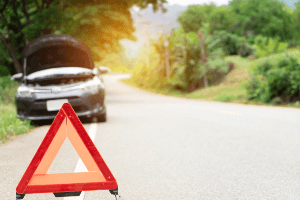 Collisions with broken down vehicles are more common than you might think – one in five accidents happen on the shoulder or roadside.
Collisions with broken down vehicles are more common than you might think – one in five accidents happen on the shoulder or roadside.
Below, learn more about how these accidents happen and who may be at fault. While the driver who crashes into the disabled vehicle is often to blame, the driver of the disabled vehicle may also hold some liability for the crash.
As these situations can become complicated, it would be in your best interest to contact a licensed auto accident attorney based in Fort Worth, TX to review your claim. We have helped victims of a wide variety of crashes recover compensation.
Common Causes of Disabled Vehicles in Roadways
These are some of the most common reasons cars break down and require drivers to pull off the road:
- Damaged tires
- Running out of gas
- Overheating
- Burnt out clutch cables (only on manual transmissions)
- Loss of oil
- Filled up car with the wrong type of gas
Assessing Liability
There are times when determining liability for a crash with a disabled vehicle can be simple and others where it may be more difficult.
A simple scenario might be a crash involving a car with a tire that goes flat on the highway. The driver safely pulls the vehicle over to the side of the road to either call roadside assistance or change the tire. If another car driven by someone under the influence of drugs or alcohol veers onto the shoulder and hits the disabled vehicle, establishing liability may be easy.
Then again, the at-fault driver’s lawyer and his or her insurance company may claim the disabled vehicle was in the road. If the driver of the disabled vehicle did not turn on his or her hazard lights, he or she may bear some amount of fault for the crash.
Assessing liability may be much more difficult if there is a crash in the middle of the road and it is not safe for the cars involved to move out of the flow of traffic. The situation could become further complicated if there is low visibility due to rain, snow or fog. Both parties could share fault.
There are many questions that would likely be considered when assessing fault:
- Was it safe for the cars to move off the road?
- Did the drivers of both vehicles turn on their hazard lights?
- Was the driver who crashed into the disabled vehicle speeding?
Scenarios such as these demonstrate why having an experienced lawyer who has dealt with many claims can be so important. Our attorneys have the knowledge and experience to evaluate your case and determine if you may be eligible to file a claim. We do not charge you anything unless you receive compensation.
How to Avoid Hitting a Disabled Vehicle
The best way to avoid any accident is to be vigilant, but there are times when obstacles on the roadways make it difficult for even the most alert drivers.
Drivers should be mindful of the speed limits and obey them. That way they should have enough time to come to a full stop if there are any obstructions on the roadway.
If you see a vehicle on the shoulder or side of the road, move to another lane if possible to give the disabled vehicle more space. In Texas, you are legally required to move over a lane if you are able and if not, you are required to slow down.
Maintaining a proper following distance is also important. If you are behind a vehicle that breaks down and you are following too closely, you may be held liable if an accident happens.
What to do if Your Car Breaks Down on the Road
If your car breaks down or is involved in a crash, there are some practical things you can do to stay safe, according to the Texas Department of Public Safety:
- Stay calm
- Pull over to the side of the road as far away from moving traffic as possible
- Turn your hazard lights on
- Exit the vehicle on the side away from traffic
- Open the vehicle’s door and leave it open
- If possible, stay with the vehicle until law enforcement arrives
- If you need to leave the vehicle for whatever reason, be sure to write down your name, the date, the time you left, the direction you are going, the plate number of the vehicle you are riding in, a description of the vehicle, and the name and a description of your passenger(s) where a law enforcement officer can see it
- If someone offers to help, keep your doors locked, crack a window and ask them to call 911
Have More Questions? Call Us Today
We do not charge you anything unless we receive compensation on your behalf. That means the initial consultation is 100 percent free of charge and comes with no obligation to take legal action.
Call the team at Anderson & Cummings today at (817) 920-9000 to schedule a free evaluation.
